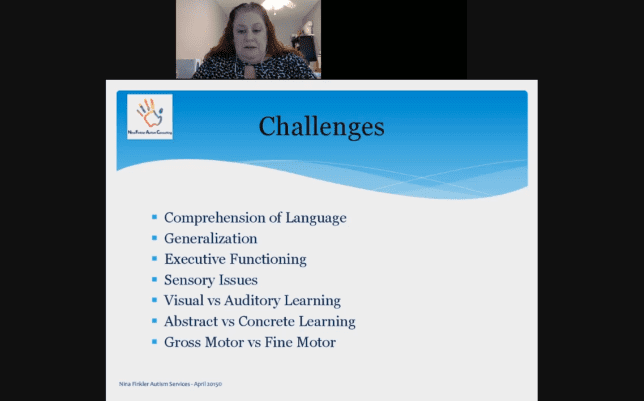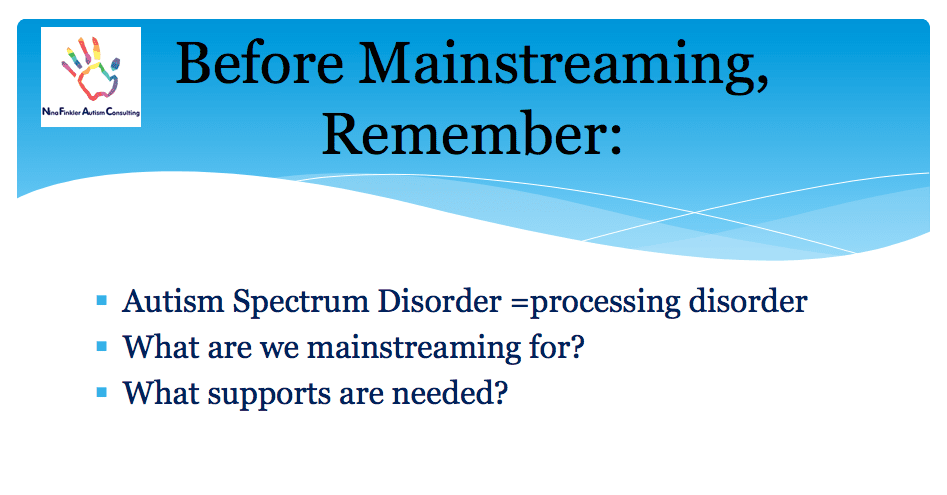Individualized Supports for Students with ASD
Autism spectrum disorder (ASD) is, at its heart, a processing disorder. And while the students with ASD face a variety of challenges depending on where they fall on the spectrum, even those considered high functioning have difficulties with pragmatic social language and understanding social interactions. So, when educators mainstream students with ASD and hope that they will learn how to interact in the classroom just by watching their peers, the educators are setting up the students for failure. Nina Finkler, a learning consultant with years of experience working with students with ASD, says success comes when schools actually acknowledge the different needs of students with ASD and set up individualized supports throughout their learning career. In her edWebinar “Meeting the Needs of Students with ASD Within the Mainstream Classroom”, Finkler outlined the biggest challenges with mainstreaming and key strategies for helping them thrive in their new environment.
First, before even considering placing a student with ASD in a mainstream classroom, Finkler advises asking why the student is being mainstreamed and what the goals are for the student. In other words, students shouldn’t be in a mainstream classroom because that’s all a school has or it’s an overall goal for the school. Students have IEP’s for a reason, Finkler reminded the attendees. They need individual accommodations to reach their learning potential, and while mainstreaming may work for some, it is not the best educational environment for all.
Once in the mainstream classroom, students with ASD will face challenges particular to their disorder, like sensory issues and understanding abstract learning. However, the biggest core challenge is often overlooked: comprehension of language. Although many students with ASD may seem overly verbal, the amount of verbal output does not always equal complexity or comprehension. Coupled with the fact that the majority of students with ASD are visual, not auditory learners, the typical amount of classroom communication could be overwhelming.
Similarly, educators often overlook that students with ASD have trouble with generalization. They don’t have an innate capacity to take a skill from a specific subject or task and apply it broadly to other classroom tasks and behaviors. Unrealistic expectations from teachers and staff can often lead to frustration when the student does not perform as anticipated.
For all of the challenges that students with ASD can face when mainstreaming, Finkler has found several strategies and supports that can increase the chance of success, including:
- Using visuals when creating lessons so that all information is not conveyed verbally
- Making predictability, organization, and consistency cornerstones throughout the school day
- Modifying lessons and assignments to remove barriers to learning, e.g., letting students with poor fine motor skills type homework instead of writing it
- Applying rules consistently within the class and the school
- Capitalizing on special interests — using them as motivation to complete tasks and encourage interaction with peers
In addition to academic concerns, Finkler says teachers often worry about behavioral issues. When deciding to mainstream students with ASD, Finkler recommends assessing behavior as well as academics to determine readiness. However, teachers also need to evaluate the environment itself. If the student is acting out, is there a consistent trigger? Is it something the teacher can easily mitigate? What consequences are there for inappropriate behavior, and are the consequences the same from all teachers?
Finkler suggests that the school and student work together to write a behavior contract that outlines specific expectations, avoiding general phrases like “being good.” “All too often I go into classrooms … and basically the student is reinforced for being good. There is nothing more vague, nothing more inappropriate, and nothing more difficult for a student to understand than what is being good,” said Finkler. “Good to me is not what’s good to them. You have to define what those target behaviors are.”
This edWeb broadcast was sponsored by Monarch Center for Autism, STAR Autism Support, and VizZle.
This article was modified and published by eSchool News.
About the Presenter
Nina Finkler, M.Ed., LDT/C, BCBA is the president of Nina Finkler Autism Services, LLC based in East Windsor, New Jersey. Ms. Finkler has 25 years of experience working in the field of autism. Her experience includes extensive practical application of applied behavior analysis, curriculum development, professional/parent training, consultation, and assessment. Ms. Finkler has presented at both the state and national levels on various topics including effective teaching strategies for students with autism, behavior management strategies, and educational assessment. She holds a master’s degree in special education from Rutgers University and is a New Jersey licensed Learning Consultant and a Board Certified Behavior Analyst. Ms. Finkler is on the advisory board of National Autism Resources.
Join the Community
Teaching Students with Autism is a free professional learning community on edWeb.net that provides ideas and resources for teachers working with students with autism, particularly advances in technology that can lead to significant breakthroughs in communication and learning.








Comments are closed.